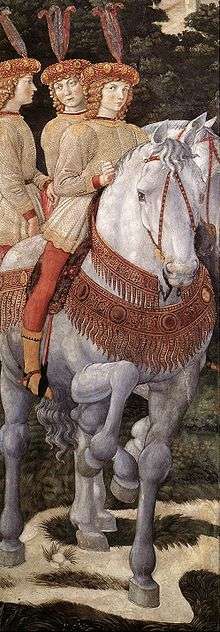Bianca de' Medici
| Bianca de' Medici | |
|---|---|
 Detail of the Journey of the Magi, fresco by Benozzo Gozzoli, sometimes thought to show Bianca between her sisters Maria and Nannina | |
| Spouse(s) | Guglielmo Pazzi |
| Noble family | House of Medici |
| Father | Piero di Cosimo de' Medici |
| Mother | Lucrezia Tornabuoni |
| Born | 10 Sep 1445 |
| Died | 1488 |
| Religion | Roman Catholic |
Bianca de' Medici (10 September 1445[1]–1488[2]) was a member of the de' Medici family, de facto rulers of Florence in the late 15th century. She was the daughter of Piero di Cosimo de' Medici, de facto ruler of the Florentine Republic, and sister of Lorenzo de' Medici, who succeeded his father in that position. She married Guglielmo de' Pazzi, a member of the Pazzi family. She was a musician, and played the organ for Pope Pius II and the future Pope Alexander VI in 1460;[3] she was a landowner.[4]
Life
Bianca was a daughter of Piero di Cosimo de' Medici and Lucrezia Tornabuoni.[2] In 1459, she married Guglielmo de' Pazzi,[5] who was a childhood friend of her brother, Lorenzo de' Medici.[6] This alliance was intended to help resolve the animosity between the families, but it was not successful in that regard as Machiavelli noted in his Florentine Histories.[7] Their first child, Contessina, was born before January 1464.[8] The marriage agreement included a significant reduction in taxes imposed on the Pazzi family.[9] In the aftermath of the Pazzi conspiracy of 1478, Bianca's marriage significantly softened Lorenzo's wrath towards Guglielmo, who was only put under house arrest for a time, while his male relatives were exiled or executed;[10] his daughters were exempted from the marriage ban imposed on other Pazzi daughters.[11]
In 1460, Bianca was asked to play the organ for Pope Pius II and his entourage during a visit to Florence, as the pope was coming back from the Council of Mantua.[12][3] Teodoro Montefeltro, the Apostolic protonotary travelling with the pope, praised the performance in a letter to Barbara of Brandenburg, Marquise of Mantua.[13] During the same papal visit, she performed a second concert for the future pope Rodrigo Borgia at his request.[3] Bianca often performed for local and visiting dignitaries, contributing to her families' reputation and influence.[3]
In 1475, Bianca asked her mother to purchase farmland from other relatives for her, as Lucrezia had more influence within the family.[4] Though Bianca owned the property, it was managed by staff employed by her mother.[4]
References
- ↑ Pernis & Adams 2006, p. 29.
- 1 2 Tomas 2003, p. 7.
- 1 2 3 4 Tomas 2003, p. 30.
- 1 2 3 Tomas 2003, p. 27.
- ↑ Pernis & Adams 2006, p. 66.
- ↑ Tomas 2003, pp. 17–18.
- ↑ Machiavelli 1845, pp. 166–167.
- ↑ Pernis & Adams 2006, p. 56.
- ↑ Ewart 2006, p. 197.
- ↑ Tomas 2003, p. 18.
- ↑ Tomas 2003, p. 106.
- ↑ Prizer 1991, p. 3.
- ↑ Prizer 1991, pp. 3–4.
Sources
- Ewart, K. Dorothea (2006). Cosimo De' Medici. Cosimo, Inc. ISBN 9781596059313.
- Machiavelli, Niccolò (1845). The Florentine Histories. Translated by Lester, C. Edwards. New York: Paine and Burgess.
- Pernis, Maria Grazia; Adams, Laurie (2006). Lucrezia Tornabuoni De' Medici and the Medici Family in the Fifteenth Century. Peter Lang. ISBN 9780820476452.
- Prizer, William F. (1991). "Games of Venus: Secular Vocal Music in the Late Quattrocento and Early Cinquecento". 9 (1). University of California Press: 3–56. doi:10.2307/763832. (subscription required (help)).
- Tomas, Natalie R. (2003). The Medici Women: Gender and Power in Renaissance Florence. Aldershot: Ashgate. ISBN 0754607771.